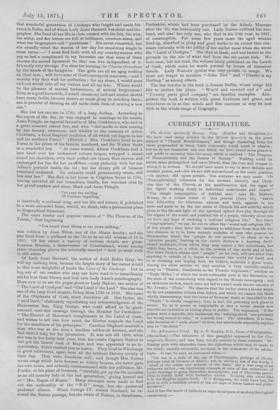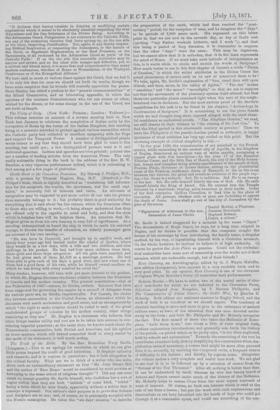77te Athanasian Creed. By A. P. Stanley, D.D., Dean of
Westminster. (Macmillan).—The substance of this pamphlet appeared in the Con- temporary Review, and was then briefly noticed in those columns. Dr. Stanley puts with admirable force the objections which may be made to the creed ; equally admirable, we think, is his statement of its advan- tages. It has, he says, an historical value :—
" Its use is a relic of the age of Charlemagne, perhaps of Clovis, perhaps even of °dewier or Alerts; not, in ordinary use of the words, a creed of the saints and anthem of the blest,' but a war song of an unknown author,—an interesting example at once of the endeavour of Latin theology to grasp Byzantine metaphysics, and of Christian spoon- ation to fortify itself with barbarian curses. Nothing also exists like it in the English prayer-book. If it disappears, wo shall have lost, for good or evil, a familiar record of the old days of fierce haters and plain- speakers."
And it has the merit of latitude as regards subjects of modern theological controversy "It declares that heresy consists in denying or modifying certain expressions which it states to be absolutely essential respecting the time Hypostases and the One Substance of the Divine Being. According to the Athanasian Greed, Pelagianism is not contrary to the Catholic Faith, nor any of the numerous theories that have sprung up, on tho one aide or the other, respecting Justification. Nor, again, is any theory respect- ing Biblical Inspiration, or respecting the Atonement, or the nature of the Devil, or Baptismal Regeneration, or the Real Presence, or the Sacraments, at all reckoned by the Athanasian Creed as parts 'of the Catholic Faith.' If on the one side this venerable confession may be narrow and severe, and on the other side meagre and defective, yet, to a critical and liberal mind, it is more free and comprehensive than many modern confessions, whether of Rome or Westminster, or the Wesleyan Conference or of tho Evangelical Alliance."
We have said so much at various times against the Creed, that wo fool it to be only fair that for once we should sot forth its merits, though we have some suspicion that its friends will scarcely appreciate the praise. Doan Stanley has added a preface to the "general recommendations" of the Ritual Commission, and an interesting appendix, in which the opinions of the nineteen Commissioners who, for one reason or other, wished for the disuse, or for some change in the use of the Creed, are set forth at length.































 Previous page
Previous page